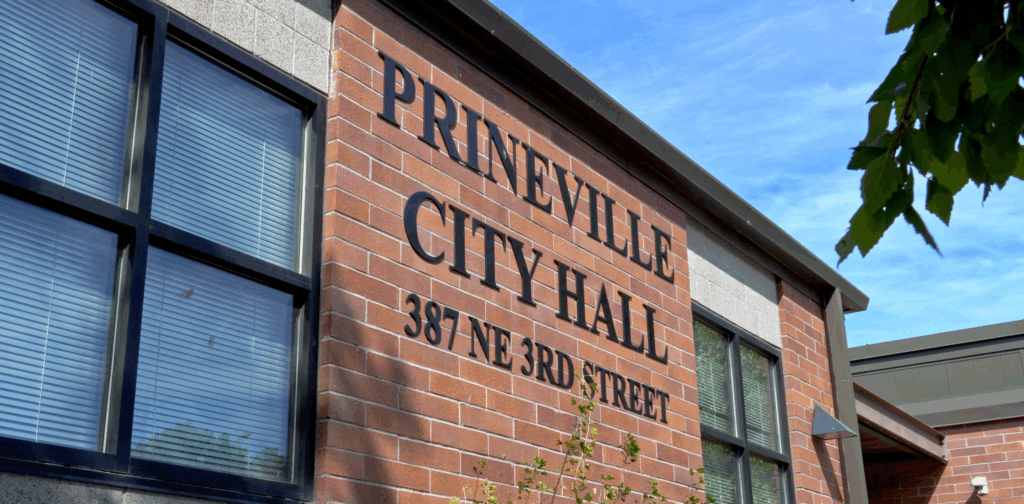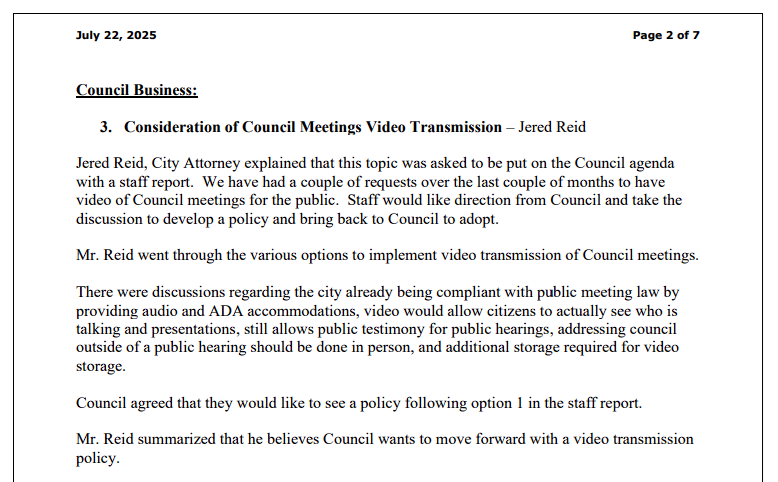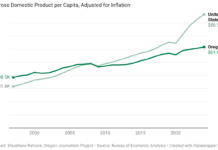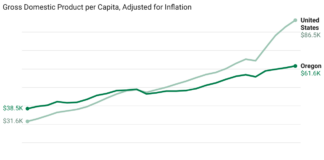
Prineville, Ore. – The City of Prineville appears to have significantly sanitized its official meeting minutes from a contentious July discussion about adding video access to public meetings — omitting any reference to the controversial remarks by several city councilors who previously argued against adding video for remote access unless the public was required to give testimony in person — a position which also violates a provision of the State’s public meetings law.
In the written minutes now published in the Aug 12th City Council agenda packet, the section regarding “Consideration of Council Meetings Video Transmission” offers no mention of those comments — including objections from multiple councilors who signaled they wanted the public to be barred from testifying remotely.
Instead, the newly released draft minutes present a heavily neutralized narrative of the July meeting:
“There were discussions regarding the city already being compliant with public meeting law by providing audio and ADA accommodations, video would allow citizens to actually see who is talking and presentations, still allows public testimony for public hearings, addressing council outside of a public hearing should be done in person…”
Notably absent is any mention of direct statements by councilors opposing allowing remote public comment — positions that appeared to ignore or challenge existing state law, which requires remote testimony anytime comment is allowed in-person.
While a full transcript for written minutes being produced is not required by Oregon law, it must accurately reflect the matters discussed and the viewpoints of the officials. While the City does appear to maintain an audio recording, the omission is likely to raise further transparency questions from members of the public amid growing controversy, especially following this publication’s recent reporting revealing the councilors’ statements.
The omission and lack of details regarding the viewpoints of council members is not a first for the City Council or Planning Commission minutes.

Despite this, the meeting’s agenda packet contains a draft of a policy that would move forward with enabling live video and long-term archiving of meetings without any stated limitations on remote public comment. A resolution scheduled for possible adoption on Tuesday lays out a clear commitment to live-streaming and archiving both City Council and Planning Commission meetings.
“The City will provide for live streaming of Prineville City Council meetings and Prineville Planning Commission meetings… [and] maintain recordings… through retention periods as required by the Oregon State Archivist.”
While the potential shift toward video access may be welcomed by transparency advocates, it comes after months of growing scrutiny — including public pressure following the Prineville Review’s reporting last week, bringing light to the potential roadblocks for Mayor Jason Beebe’s initiative to increase public access and transparency.
However, Beebe is scheduled to be absent from the Aug 12th meeting as he is out of the country. It was not clear who drafted the July 22nd meeting minutes for the City Council.
The upcoming Aug 12th meeting is expected to discuss the possible adoption of the resolution, numbered 1630. Whether the city will acknowledge the prior controversy or attempt to move forward without addressing it remains unclear, especially when its chief proponent, Mayor Beebe, is expected to be absent.
We did not reach out to the City for comment prior to publication due to the weekend. However, City Manager Steve Forrester has maintained what amounts to an effective blacklist against the Prineville Review since late last year, repeatedly refusing requests for comment on numerous topics and stories — including as recently as late last month.
The issues surrounding public meetings and records compliance are not new for the City in recent history.
Early last year, numerous media organizations requested public records from the city involving settlements with former Police Chief Larry Seymour and Captain Rob Gray, who were under investigation for alleged workplace harassment. According to KTVZ News, The Oregonian then retained legal counsel after the City initially refused to provide records, eventually relenting amid the legal pressure, which cited a clear statute providing for the release of the records.
On multiple occasions in the last year, Reid intervened and directed City officials to release records to the Prineville Review. In one instance involving the Prineville Police Department, the City had initially denied the request, ignored inquiries asking for the statutory basis of any claimed exemptions, and failed to meet required response timelines to the requests.’ Reid explained that staff was wrong in their failure and that the Prineville Review was correct
In December, the City of Prineville Planning Commission also admitted to multiple violations of Oregon’s public meeting law in response to a public meetings grievance submitted by the Prineville Review. Despite a warning from this publication to the commission immediately before starting the meeting, it proceeded anyway with the meeting on Nov. 19th, having not provided for any remote attendance.
The Prineville Review had also brought up the concern on multiple occasions with City Planning Director Josh Smith in the months prior, expressing our desire to attend meetings remotely and in response to reports from citizens asking why the public body was not allowing remote attendance.
The City claimed that providing the remote attendance option was “unnecessary spending of public resources”, but ultimately said it would begin providing remote attendance, according to its written response.
“The [Planning] Commission admits that it did not provide to members of the general public access to attend the meeting by telephone, video, or other electronic or virtual means. This is in violation of ORS 192.670(3). The Commission discontinued this practice as it
was not being utilized by the public and resources of having additional staff for IT purposes was unnecessary spending of public
resources…Nevertheless, the Commission does have the technical resources to comply with ORS 192.670(3) and will do so
moving forward,” wrote Reid on behalf of the City’s planning commissioners.
The Planning Commission had not been providing for remote attendance for some time, but only the Nov. 19th meeting was subject to the grievance due to a 30-day limitation for citizens to file a public meetings grievance form when a violation took place. This publication did not escalate the issue to a formal complaint with the Oregon Government Ethics Commission at the time.
In June, the City’s Budget Committee also failed to provide for any remote attendance in its May notice and June notice.
Note: This story was updated shortly after publication to include links to materials obtained from the City related to meeting notices.
Mr. Alderman is an investigative journalist specializing in government transparency, non-profit accountability, consumer protection, and is a subject matter expert on Oregon’s public records and meetings laws. As a former U.S. Army Military Police Officer, he brings a disciplined investigative approach to his reporting that has frequently exposed ethics violations, financial mismanagement, and transparency failures by public officials and agencies.





